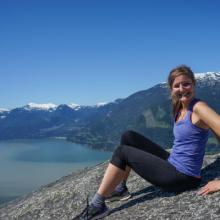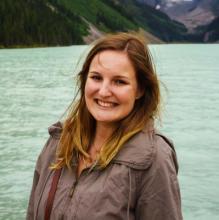Katriona Stewart
Katriona Stewart was a participant in the 2017 UBC Three Minute Thesis competition, with her presentation, “Resisting Rationality”.
Why did you decide to pursue a graduate degree?
To further my holistic education.
Why did you decide to study at UBC?
UBC is a world-renowned institution with a great ethos. I chose the university because of its academic reputation, international outlook and its focus on inclusivity and sustainability. The campus is also located in spectacular Musqueam territory – nothing beats looking out to the Howe Sound and the snow-capped Tantalus Range as you walk down Main Mall!
What is it specifically, that your program offers, that attracted you?
The UBC Political Science department is known for its rigorous methodology teaching and esteemed faculty and alumni. The department is relatively small which helps foster a supportive collegial environment; you quickly get to know other students and faculty through workshops, colloquia, and social events. For me, one of the biggest drawcards was affordability. The UBC Master of Arts is considerably less expensive than similar programs at other North American universities, and there are multiple funding opportunities (even for international students like myself). I have largely been able to cover my tuition and living costs through TAships, the International Tuition Award, and through working part-time through the UBC Work Learn program.
What was the best surprise about UBC or life in Vancouver?
Ironically, the best surprise was the weather! I’d been told to expect non-stop dreary drizzle, and sure, there is a lot of rain in the winter, but summer here is just stunning. I moved to Vancouver in 2015, and that year we had nearly six months of glorious sunshine. November to January can get a little bleak, but not if you get into skiing/snowboarding – rain in the city usually means snow on the mountains!
What do you see as your biggest challenge(s) in your future career?
It will be tough trying to break into the workforce in a new country as I’ve had to build new networks from scratch, and sometimes feel like my international qualifications/experience are not always properly understood/recognized (for example, I have a law degree from New Zealand, but can’t practice in Canada) However, I think my biggest challenge will be overcoming a lack of confidence. I recently went to a thought-provoking UBC workshop on the Imposter Syndrome, a pervasive pattern particularly prevalent in young women, whereby highly capable individuals felt inept and fear being exposed as a ‘fraud.’ The presenter Dr. Valerie Young asked the audience of nearly 200 to raise their hands if they had felt like imposters - it was amazing to see just how many highly intelligent students faculty/staff were unable to internalize their achievements.
How do you feel your program is preparing you for those challenges?
My program has greatly helped me to overcome my confidence issues as I am constantly being pushed outside my comfort zone. For example, I recently participated in the UBC Three Minute Thesis. Prior to taking part in 3MT, I avoided talking about my thesis as I struggled to articulate exactly what I was researching and why it is important. 3MT has helped me streamline my argument to its essence and uncover the significance of my research. I am now a lot more confident about the work I am doing and how it will benefit the wider community. Throughout my time at grad school, I have learned how to think critically, quickly synthesize and articulate my ideas, and have been taught a range of useful research methods. I have also gained valuable work experience through my role as a Teaching Assistant and Student Assistant for the Graduate Pathways to Success Program and Centre for Communications and Strategic Initiatives. Each day I learn new information and transferable skills so that I am a step closer to becoming an expert in my field.
What do you like to do for fun or relaxation?
BC is an outdoor lover's paradise. In my spare time I enjoy skiing, snowshoeing, cycling, running, hiking, camping and chilling out on the beaches near campus. Grad school can be taxing on your mental health - the lack of a fixed routine can make it difficult to create work-life balance. Practice self-care and block off sections of the day solely for hobbies/social time. Join the Interdisciplinary Student Writing Community, reach out to friends, drop by the UBC Wellness Centre, or book an appointment with UBC Counselling Services. The worst thing you can do is alienate yourself.
What advice do you have for new graduate students?
While it’s tempting to put off decisions/commitments until later in your program, if you're not proactive, you’ll miss out on important opportunities. I strongly encourage new graduate students to create a game plan. This will not only hasten your academic progress (certain steps like obtaining ethics approval need to be completed well in advance), but it will also help with professional and personal development. UBC has many amazing services/facilities on offer – a plethora of clubs, free GPS workshops, career resources, networking events, access to seminars, museums, art galleries, REC facilities…make the most of these resources while you can!

